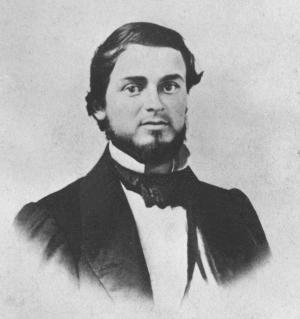 "So far as I am concerned, if they are hungry let them eat grass or their own dung."
"So far as I am concerned, if they are hungry let them eat grass or their own dung."
Andrew Myrick to Agent Galbraith, 1862.
Andrew Myrick was born in 1832. He was a trader at the Lower Sioux Agency at the time of the U.S.-Dakota War and is often considered in part responsible for the start of the war. When Dakota leaders asked the traders to extend them more credit for goods when annuity payments were late, the traders refused. Myrick wrote a letter to his brothers about the incident:
"A.J. Myrick to Dear Brothers July 26, 1862, OIA Special File 271.
[Lower] Sioux Agency July 26th [18]62
Dear Brothers —
The Lower Indians have been playing the devil in general. They had two secret councils at which they resolved not to pay a dollar of their credits, established a soldiers lodge of one hundred warriors to execute the plan.... we all determined not [to] give any more credit hoping to starve them into a change of sentiment....
[Yesterday] they formed a line of battle marched to all the stores and made the following… speech “You have said you have closed your stores for 2 Sundays and that we should have to eat grass. We warn you not to cut another stick of wood or to cut our grass,” feeling themselves probably much relieved departed ... In their secret council there [were] some intimations that the present traders were to be driven off and someone new to have exclusive control of the trade. Now whether the agent had anything to do with it we can’t find out but it looks very much as if that was the programme.
I am at a loss and so doing have given out no credits since last Sunday and at present deem it best not to give away any more for a week or ten days hoping it will produce a reaction. They will get very hungry and possibly if the officials are not engaged in it they may change their sentiments and favor paying their credits ...
I wish you could come up and suggest to Forbes to come and help straighten out the snarl the Indians have got us in. I have not talked with them yet seeming it best to let them get hungry first hoping they might retract and become decent again."
On August 18, at the start of the U.S.-Dakota War, Myrick was killed while trying to run away from the Lower Agency, one of the first whites to die. Stories say he was found with grass stuffed in his mouth.
Secondary
Anderson, Gary Clayton. "Myrick's Insult: A fresh look at myth and reality," Minnesota History, Spring 1983, 198-206.




